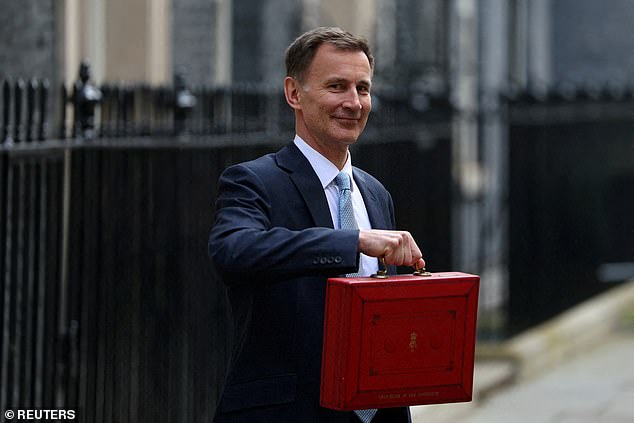This week’s state pension rise was billed as one of the biggest ever seen. But Money Mail can reveal that less than a third of pensioners were given the full 8.5 per cent increase on their entire incomes.
Two in three – as many as eight million pensioners – received a smaller increase to their payouts this year.
This is due to little-known rules that penalise older pensioners most and that have been branded ‘unfair’ by a former pensions minister.
In the worst cases, pensioners have been short-changed by more than £192 a year.

Older pensioners will be left most out of pocket this year, warns former pensions minister Baroness Ros Altmann
The triple lock, which ensures the state pension rises each year, has long been championed as a core tenet in the Tory party manifesto and one that the Government has proudly said will protect the incomes of all pensioners.
The pledge guarantees that the core part of the state pension rises by the highest of inflation, wage growth or 2.5 per cent each April.
This year, the triple lock meant that the state pension rose by the rate of wage growth, which was 8.5 per cent. This represents the second largest rise since the mechanism was introduced in 2010.
The bumper rise was expected to provide a much-needed boost to retired households following a period of high inflation.
But legacy rules mean that certain parts of the state pension payment predominantly received by older retirees are not bound by the triple lock and instead rise by inflation each year.
This year’s inflation figure, 6.7 per cent, is lower than the triple lock rise of 8.5 per cent. This means that more than eight million pensioners out of 12 million have been left short on a portion of their state pension.

Chancellor Jeremy Hunt handed workers a 2p cut in National Insurance for the second time in six months during his Spring Budget in March
Older pensioners will be left most out of pocket this year as a result, warns former pensions minister Baroness Ros Altmann. This is because they are most likely to receive parts of the state pension that are not covered by the triple lock.
She says there will be many people who are left confused by this week’s rise.
‘The triple lock is a political trick which is meant to be politicians’ shorthand for saying we will look after pensioners and the Government gets away with it because it is complicated and outdated,’ she says. ‘It gives the biggest rises to the youngest pensioners, which is the wrong way round.
‘It’s long overdue that we review how we protect pensioners, and particularly the oldest who tend to be poorer and need it the most.’
By denying the full increase to pensioners, the Government will save more than £350million, analysis of official data has found.
Here, Money Mail explains how to work out if you’re affected.
What does the triple lock promise?
The triple lock applies to the core part of the state pension, which is based on how many years of National Insurance contributions you have made.
It has been in place for more than a decade and the Conservative government has pledged to maintain the rules, should it win the next General Election. Labour has hinted that it is likely to commit to the same policy.
On Monday, the triple lock meant that the new state pension — paid to those who reached pension age after 2016 — increased by £902.20 a year to £11,502.40, or £221.20 a week.
It also pushed up the basic state pension – paid to those who reached pension age before 2016 – from £156.20 to £169.50. This equates to £8,814 a year.
So which parts of the state pension were excluded?
The old state pension, which is paid to those who reached pension age before 2016, was comprised of two parts.
The first is the basic state pension, where your NI record determined how much income you would get. The second is called ‘additional state pension’, which took into account your earnings and whether you claimed benefits.
The triple lock only applies to the basic state pension but not to the additional state pension element.
Most pensioners who retired before 2016 on the old state pension built up entitlement to this additional earnings-related element of the state pension. It is this part of the payment that will only ever rise by inflation.
This means it will increase by 6.7 per cent, September’s rate of annual inflation, and not 8.5 per cent.
For years this additional element was called ‘Serps’ (state earnings-related pension scheme). It later became the State Second Pension (S2P).
For some, Serps makes up more than half of their state pension. Some people receive as much as the full basic pension of £169.50 a week plus a maximum Serps pension of £185.90 a week.
Of the 7.6 million pensioners receiving Serps the average person gets £2,542.25 a year – or £48.90 a week, according to analysis of official figures.
Anyone who receives the graduated retirement benefit, a previous version of earnings-related state pension top-up that operated between 1961 and 1975, will also receive only an inflation-linked increase to this component of their income.
The maximum additional state pension you can receive in the 2023/24 tax year is £204.68 a week. This includes any entitlement you might have to both Serps and S2P, and any additional state pension you might inherit from a spouse.
Someone receiving the maximum additional state pension last year would now be £192 a year better off if their whole state pension had risen under the triple lock rate of 8.5 per cent this year.
Is anyone on the new state pension affected?
Retirees who opted to receive an enlarged state pension by deferring when they hit state pension age will also lose out. This applies whether you deferred under the old or new state pension.
You can delay your state pension by a minimum of nine weeks and get more money when it begins. Under the system in place since 2016, your weekly income rises by 1 per cent for every nine weeks you defer, which adds up to 5.8 per cent for every year you push it back.
Because the deferred payments rise with inflation rather than the triple lock, pensioners will miss out on an extra £11 for every year they pushed it back.
When the new state pension was introduced in 2016, there are some pensioners who would have been better off under the old system. This is because they would have benefitted from the likes of Serps.
To ensure that they did not lose out under the new system, these old entitlements were ‘protected’. These ‘protected payments’ top up the new state pension to the position they would have been in under the old state pension.
However, these protected payments are also not protected by the triple lock, according to Steve Webb, also a former pensions minister and now partner at consultancy LCP.
This is the first time in three years that the quirk in the triple lock rules means that pensioners have been shortchanged. For the past two years, the state pension has increased by inflation and therefore all elements have risen in tandem.
‘I’m furious my pension won’t rise by the full amount’
David Salisbury, from Northampton, was surprised and confused to see that his pension would rise by less than the widely advertised rate when he received a statement about the increase a couple of weeks ago.
Rather than increasing by the full 8.5 per cent, his pension will grow by 8.18per cent, he says.
This is because the 69-year-old, who receives the new state pension, also gets a ‘protected payment’ on top. This portion will rise by just 6.7 per cent, rather than the full 8.5 per cent.
Had his entire pension increased by the full amount, he would be £40 a year better off.
He says: ‘I’m not missing out on a fortune but it’s the principle of it and compound interest means that over the years I will be poorer and poorer.
‘Politicians have been highly misleading and are letting us down by being so penny pinching.
‘It is unfair that our entire state pensions aren’t increasing by the amount they are proudly waffling on about. Politicians are not being straight forward and honest with people.’
It’s a double blow for pensioners like David, who were snubbed during the Government’s recent tax cuts.
Chancellor Jeremy Hunt handed workers a 2p cut in National Insurance for the second time in six months during his Spring Budget in March.
However, the tax cuts, which are worth a collective £900 for the average worker, will not help pensioners because they do not pay National Insurance.
Baroness Altmann says: ‘Pensioners may well feel that things are focused against them rather than for them at the moment.’
Many pensioners also face a growing tax burden. More than half a million pensioners will be hit with income tax bills for the first time since retiring after the state pension rose on Monday.
‘And over the next four years, up to 1.6 million more pensioners will be paying income tax as a result of the Government’s stealth tax heist, according to forecasts from the House of Commons Library.
The Department of Work and Pensions has been contacted for comment.
j.beard@dailymail.co.uk
Some links in this article may be affiliate links. If you click on them we may earn a small commission. That helps us fund This Is Money, and keep it free to use. We do not write articles to promote products. We do not allow any commercial relationship to affect our editorial independence.











